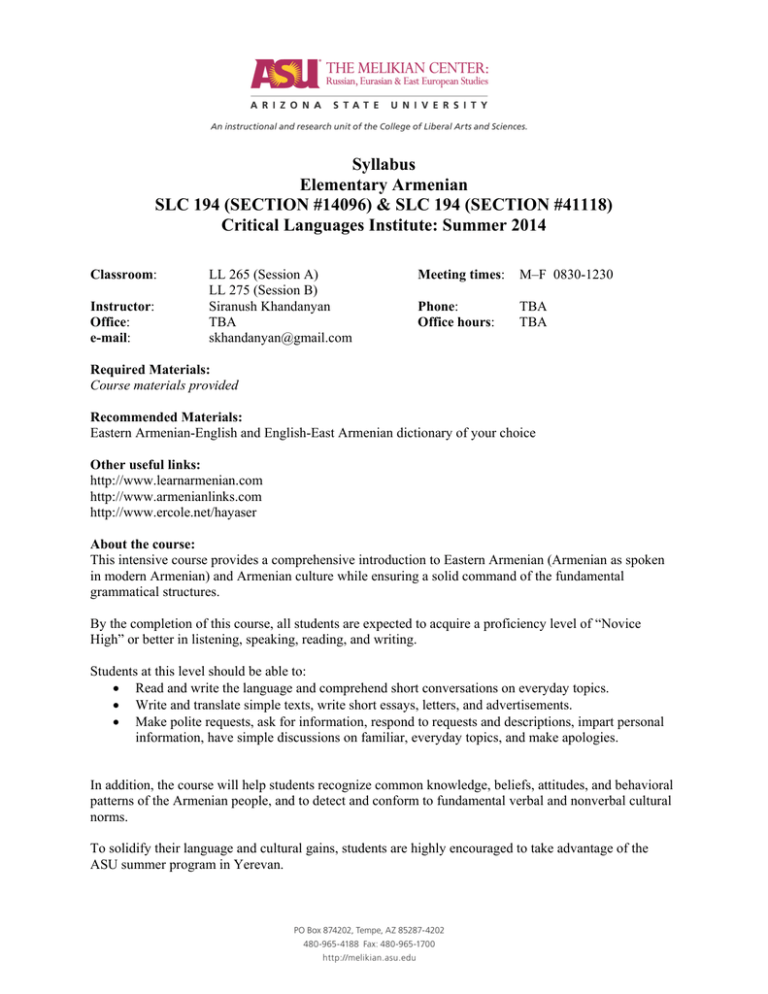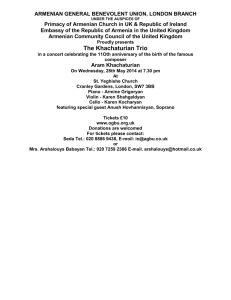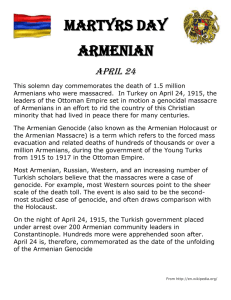Critical Languages Institute: Summer 2014
advertisement

Syllabus Elementary Armenian SLC 194 (SECTION #14096) & SLC 194 (SECTION #41118) Critical Languages Institute: Summer 2014 Classroom: Instructor: Office: e-mail: LL 265 (Session A) LL 275 (Session B) Siranush Khandanyan TBA skhandanyan@gmail.com Meeting times: M–F 0830-1230 Phone: Office hours: TBA TBA Required Materials: Course materials provided Recommended Materials: Eastern Armenian-English and English-East Armenian dictionary of your choice Other useful links: http://www.learnarmenian.com http://www.armenianlinks.com http://www.ercole.net/hayaser About the course: This intensive course provides a comprehensive introduction to Eastern Armenian (Armenian as spoken in modern Armenian) and Armenian culture while ensuring a solid command of the fundamental grammatical structures. By the completion of this course, all students are expected to acquire a proficiency level of “Novice High” or better in listening, speaking, reading, and writing. Students at this level should be able to: Read and write the language and comprehend short conversations on everyday topics. Write and translate simple texts, write short essays, letters, and advertisements. Make polite requests, ask for information, respond to requests and descriptions, impart personal information, have simple discussions on familiar, everyday topics, and make apologies. In addition, the course will help students recognize common knowledge, beliefs, attitudes, and behavioral patterns of the Armenian people, and to detect and conform to fundamental verbal and nonverbal cultural norms. To solidify their language and cultural gains, students are highly encouraged to take advantage of the ASU summer program in Yerevan. Program Structure: This class is divided into two sessions. The first session covers the material normally included in the fall semester. The second covers the material normally included in the spring semester. You will receive two grades; one for each session. Session I: Session II: June 2—June 24 June 25—July 18 Grading system per session: Class participation Homework Weekly tests, quizzes, presentations Final examination Grade A+ A AB+ B BC+ C CD F (final exams on June 24) (final exams on July 17) *July 18th will be a half day. 10% 10% 50% 30% Percent 98–100 93–97 90–92 87–89 83–86 80–82 77–79 73–76 70–72 60–69 0–59 Auditing and Incompletes: Since CLI courses are tuition free, they cannot be taken for audit. There is no not-for-credit option. All students will receive a grade for their class. CLI does not issue grades of Incomplete. Students who do not complete coursework by the end of CLI will be graded normally, with a grade of zero for any assignment not completed. Class Time versus Homework: This intensive course relies heavily on work performed outside the class. Class time concentrates on activities that you cannot perform effectively without the immediate feedback of an instructor, for example: conversation, structured oral drills, active listening comprehension, etc. Activities for which no instructor is necessary will typically be performed as homework, for example: reading, writing, and composition; grammar, etc. In particular, you will be expected to read ahead and to work with material that has not yet been covered in class. It is the student’s responsibility to learn assigned material before class, then come to class prepared to apply what they have learned. Instructors will not necessary go over every homework topic in class. Instead, they will concentrate are topics that are particularly difficult or particularly important. Students are responsible for mastering every topic assigned, including topics not emphasized in class. With a course moving at 5 times the usual speed, preparation is critical. Students who come to class unprepared will find it difficult to succeed. Participation: Since the course relies so heavily on listening and speaking practice, attendance and participation are mandatory and count toward your final grade. Class participation will reflect the student’s daily preparation and active participation in class discussions. A student who is chronically late to class, leaves early, or is not prepared to participate will not receive full attendance and participation credit. Students who miss more than two classes over the course of the 7-week session without prior consent of the instructor or CLI administration will receive a zero for class participation and will be asked to withdraw from the course. Homework Grading: Homework is your opportunity to practice new structures. It is expected that you will make mistakes; you will not be marked down for doing so. As long as you complete your homework and turn it in on time, you will receive full credit. Academic Dishonesty: Academic honesty is expected of all students in all examinations, papers, laboratory work, academic transactions and records. The possible sanctions include, but are not limited to, appropriate grade penalties, course failure (indicated on the transcript as a grade of E), course failure due to academic dishonesty (indicated on the transcript as a grade of XE), loss of registration privileges, disqualification and dismissal. For more information, see http://provost.asu.edu/academicintegrity. Students with Disabilities: Establishing Eligibility for Disability Accommodation. Students who feel they will need disability accommodation must register with the Disability Resource Center (DRC) as early as possible. DRC is located on the first floor of the Matthews Center Building. DRC staff can also be reached at: 480-9651234 (V), 480-965-9000 (TTY). For additional information, visit: www.asu.edu/studentaffairs/ed/drc. Their hours are 8:00 AM to 5:00 PM, Monday through Friday. Accommodation. Qualified students with disabilities requiring accommodation who have registered with DRC may make request for accommodation to the instructor at the beginning of the summer, either during office hours or by appointment. Disability information is confidential. Note: Be sure to obtain verification of eligibility from DRC before contacting your instructor. Instructors cannot make accommodations if you do not have verification of eligibility from DRC. Daily Schedule: 08:30 – 9:20 class 09:20 – 9:30 break 09:30 – 10:20 class 10:20 – 10:30 break 10:30 – 11:00 class 11:20 – 11:30 break 11:30 – 12:30 class (Language Coach) Weekly Plan (subject to change) SESSION I Week June 2–6 Chapters Lesson 1-2 June 6: Test One June 9–13 Lesson 3. 4 . 5 June 13: Test Two Material covered Lesson 1-2 Introduction to the course. Eastern and Western Armenian. The Armenian Alphabet and the Sound System. Stress. Armenian Letters. Card games with the letters Speech Acts and Dialogues: Greeting and Farewell. Requesting and receiving personal information Topics: Questions and Answers. Expressing possession. Present Actions. Describing things. Grammar: The Noun: Plural Formation. The Definite Article. The Indefinite Article The Verb: The Armenian Infinitive. The Auxiliary Verb em (to be). The Present Tense. The Verb unem (have). Pronouns: Personal Pronouns. Possessive Pronouns. Numeral: Cardinal numerals. CD Golden Armenian: Sound drills. Dialogs: 1, 2, 5, 7. Lesson 3-4-5/Unit 1 Letters. Speech Acts and Dialogues: Identifying Things and persons. Affirming and denying states and actions Topics: Inquiring about Quantity. Describing Things. Giving Personal Information. Rooms and Furniture. Classroom items Colors. The Days of the Week. The names of the months. Grammar: The Noun: Declension of Nouns. Genitive Formation. The Verb: The Verb em in the Past.Regular verbs/irregular verbs. The Past Progressive Tense. Negative Conjugation of the Auxiliary em. Demonstrative Pronouns. The Armenian Prepositions and postpositions. Numerals: Ordinal Numerals CD Golden Armenian: Sound drills. Dialogs: 3, 4, 8, 18, 6, 9, 12. June 16–20 June 23–27 Lesson 6-7 Unit- 1-2 June 20: Test Three Units 3-4 Session I Final Tues June 24: Test 4 Session I Final Unit 2- 3/ Lesson 6-7 Spelling of the Consonants. Spelling of the Vowels. Phonetic Drills. Speech Acts and Dialogues: Making request and responding to them Topics: Lessons and Learning. Food Grammar: The Noun: Derivation of abstract nouns. Derivation of nouns denoting location The Verb: The indicative imperfect tense Introduction to the Armenian Adjectives and Adverbs. Word Formation: Suffixes. ( Noun Forming and Adjective forming) CD Golden Armenian: Sound drills. Dialogs: 26, 30, 31, 49. Unit 4 Speech Acts and Dialogues: Introducing Family and Friends Topics: Family and relatives . A Lesson. Occupation. Family. Place. Describing Appearance. Grammar: The Noun: The Armenian Possessive Articles. The Genitive and Dative Cases. The Nominative and Accusative Cases. The Verb. The Simple Past tense. The Imperative Mood. General Questions. Special Questions. Personal Pronouns: Genitive case. (Dependent and Independent Forms). Word Formation: Suffixes. CD Golden Armenian: Dialogs: 10, 11, 38, 34, 109. SESSION II Week Chapters June 30–3 July Units 5-6 July 4: No Class July 3: Test Five July 7–11 Units 6-7 July 11: Test Six Material covered Units 5 Speech Acts and Dialogues: Asking for an opinion and expressing one Topics: Clothes, Colors. Telephone Conversation. On the Street. Asking the way. At the Store. Country. Nationality. Language. Speaking about Origin. Time. Grammar: The Verb. The Perfect and pluperfect tenses . The Noun: Declension Types. The Accusative and Dative Cases. Word Formation: Suffixes. CD Golden Armenian: Dialogs: 15, 78, 130, 144, 42. Units 6-7 Speech Acts and Dialogues: Asking about and telling time Topics: Time Expressions Grammar: The Verb : The Future and the future imperfect .The Imperative Mood The Noun: The Ablative Case The Pronoun: Personal Pronouns in Dative and Accusative. Personal Pronouns with Prepositions and Postpositions. Numerals: Fractional numerals. Distributive numerals Conjunctions: bayts (but), isk (and), kam (or), ev... ev (both...and) kam ...kam (either...or), te ...te (both ... and), voch ...voch (neither... nor), te (or?). Word Formation: Suffixes. CD Golden Armenian: Dialogs: 70, 81, 85, 110, 120. July 14-–18 Units 7-8-9 Thur July 17: TEST 7 Session II Final 7-8 Speech Acts and Dialogues: Weather and Seasons, In the City. Topics: Seasons and weather. The Nature.Speaking About the Future Body Parts. . Grammar: The Verb: Expressing Future: u-Future, piti -Future forms The Noun: Declension by -an. The Accusative and Dative used when Expressing Time. Declension of Demonstrative Pronouns. Definite Pronouns. Negative Pronouns. : Personal Pronouns in the Ablative, Instrumental and Locative Cases. Postpositions of Place. Conjunctions: te (that), teyev (although), qani vor (because). Preposition het and Postposition arants. Postpositions heto and araj. Word Formation: Suffixes. CD Golden Armenian: Dialogs: 10, 40, 90, 54, 60, 133.

